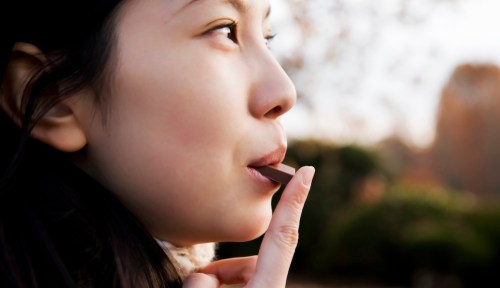Does Chocolate *Actually* Increase Your Sexual Arousal or Is That a Scam? We Asked a Sex Expert
Many people have wondered, "Is chocolate sexually arousing?" We asked a sex expert to answer and explain why that's the case.

When you’re thinking of ways to spice up your sex life, you might turn to aphrodisiacs because you’ve heard that certain foods may increase your sexual arousal. Common aphrodisiacs include oysters, wine, and, of course, chocolate (especially whenever Valentine’s Day is around the corner). Romantic partners often gift each other chocolate for the day of love celebration, but is chocolate actually sexually arousing, too?
Experts in This Article
licensed psychotherapist, cognitive neuroscientist, and certified sex therapist
Before answering this question, certified sex therapist and neuroscientist Nan Wise, PhD, says it’s crucial to differentiate between physical arousal and sexual arousal. To explain, physical arousal has more to do with engaging your senses through external factors, while sexual arousal is directly tied to whether or not you’re turned on enough to want to engage in sex.
Dark chocolate in particular is, in fact, physiologically arousing, says Dr. Wise. This is because it both smells good and contains caffeine as well as phenethylamine (PEA), a naturally occurring chemical compound that stimulates humans’ central nervous systems.
“Chocolate has key compounds in it that are precursors for dopamine and also serotonin.” —neuroscientist and sexologist, Nan Wise, PhD
“PEA also releases dopamine, which is the main [thing] people think of as the pleasure neurotransmitter,” Dr. Wise says. “Plus, chocolate actually has key compounds in it that are precursors for dopamine and also serotonin, [which] is more of a soothing neurotransmitter.”
However, in terms of an empirical answer to whether or not chocolate is sexually arousing, Dr. Wise says she hasn’t come across literature that statistically supports this link. Chocolate, she says, is more akin to a mood-booster than it is to something that causes sexual arousal.
“The idea of it being specifically an aphrodisiac, I think, is not quite as true as it being something that may actually bump up mood and get the brain working better,” says Dr. Wise. That said, if you find that chocolate does actually have an effect on your sexual arousal, there’s no need to stop consuming it.
“The most important sex organ is your brain.” —neuroscientist and sexologist, Nan Wise, PhD
“The most important sex organ is your brain,” says Dr. Wise, so there’s more of a placebo effect at play than anything else when it comes to aphrodisiacs and chocolate, in particular. For instance, a 2021 study of chocolate consumption and sex interest found that the more people ate chocolate, the more likely they were to provide lower self-ratings of sex interest—which underscores that the answer to the “is chocolate sexually arousing question” is, well, not exactly. However, this does not automatically mean that the physiological arousal you’re experiencing from eating chocolate is worth discounting.
“Anything that is beneficial for the brain is going to be potentially beneficial for the brain’s functioning during sex,” says Dr. Wise. That’s especially true when you consider that eating chocolate releases happy chemicals in your brain—even if it’s not directly leading to increased sexual arousal.
“Chocolate is likely not responsible for your erotic energy, but it can facilitate your physiological arousal enough and put you in a better mood,” says Dr. Wise. “If you’re feeling better mood-wise, and you’re feeling more energetic, sexual possibilities may become more [desirable] to you.”
But what about the other, aforementioned aphrodisiacs—like wine and oysters?
Are other aphrodisiacs linked to sexual arousal?
According to Dr. Wise, there is an even larger placebo effect when it comes to wine and oysters—which she doesn’t count as foods that are arousing, period.
“[Wine and oysters] are not necessarily chemically or physiologically arousing in the way that chocolate is,” says Dr. Wise. “It’s more the association that people have about something being potentially an aphrodisiac.” With wine, the ingredient at play is the alcohol, which might relax you and lower your inhibitions.
Using oysters as an example, Dr. Wise says that though there is magnesium in oysters—which helps reduce inflammation and can be beneficial to muscle function—it’s a “big jump” to say that the food is an aphrodisiac. In this case, says Dr. Wise, any arousal one feels has more to do with how the individual thinks about the mollusk and how exotic or rare they personally find them.
So, the next time you find yourself wondering “is chocolate sexually arousing?”—or “will a glass of wine put me in the mood?”—you’d be wise (no pun intended) to remember that even if it’s scientifically not the case, you shouldn’t stop doing what works for you in terms of sexual arousal.
Oh hi! You look like someone who loves free workouts, discounts for cutting-edge wellness brands, and exclusive Well+Good content. Sign up for Well+, our online community of wellness insiders, and unlock your rewards instantly.
Sign Up for Our Daily Newsletter
Get all the latest in wellness, trends, food, fitness, beauty, and more delivered right to your inbox.
Got it, you've been added to our email list.










